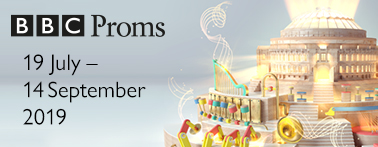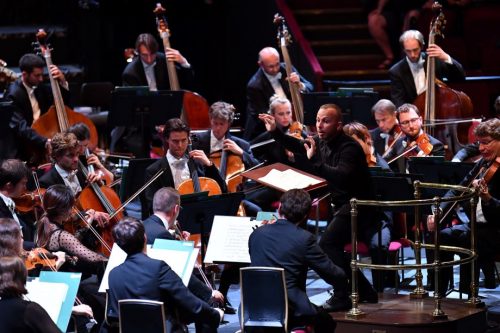
 United Kingdom BBC Prom 15 – Beethoven and Shostakovich: Bavarian Radio Symphony Orchestra / Yannick Nézet-Séguin (conductor), Royal Albert Hall, London, 30.7.2019. (CSa)
United Kingdom BBC Prom 15 – Beethoven and Shostakovich: Bavarian Radio Symphony Orchestra / Yannick Nézet-Séguin (conductor), Royal Albert Hall, London, 30.7.2019. (CSa)

Beethoven – Symphony No.2 in D major
Shostakovich – Symphony No.5 in D minor
After watching his pupil and musical assistant Vernon Hanley conduct a performance of a Bax symphony, the late Sir Adrian Boult noticed that Hanley had moved his right foot twice during the third movement. ‘Was there any particular significance in that?’ asked Sir Adrian. One wonders what the famously undemonstrative conductor would have made of Yannick Nézet-Séguin, the newly appointed Director of the Metropolitan Opera and Principal Conductor of the Philadelphia Orchestra. In particular, what would Sir Adrian have thought of Nézet-Séguin’s exaggerated physicality when conducting the Bavarian Radio Symphony Orchestra in Beethoven’s Symphony No.2, which opened this Prom? Filling in for an indisposed Mariss Jansons, the young maestro’s beat-less and baton-less direction verged on the ecstatic: dancing, swaying and bouncing on the podium, his arms whipping the orchestra, his hands gesturing dramatically with every musical inflection. I found myself asking whether such seasoned players required, or indeed responded, to this form of micro-managed supervision, when performing a piece so familiar to them? The presentation itself was as faultless and smooth as a plane on auto-pilot. The orchestra’s richly sonorous strings, burnished brass and peerless woodwind played in perfect coordination, and individual detail was carefully observed, especially in the joyous third movement Scherzo and in a breathless final Allegro molto. Yet there was hardly a glance towards the podium for guidance. Perhaps the finer details of interpretation had been hammered out in rehearsal.
Shostakovich’s Fifth Symphony made up the second part of the evening. Linked by a common thread, Beethoven’s Second and Shostakovich’s mighty Fifth represent outpourings by young men in response to painful and personally tragic events, and both works suggest triumphant resolutions. In Beethoven’s case, his ebullient dance-like Second masked suicidal despair at his encroaching deafness, while Shostakovich’s masterpiece – subversively entitled A Soviet Artist’s Response to Justified Criticism – was written after official denunciation, following the popular success of his opera Lady Macbeth of the Mtsensk District.
Nézet-Séguin appeared more settled after the interval, and his expressive but no less energetic direction appeared more obviously relevant to the BRSO’s performance. The result was transcendent, and revealed the players’ brilliance, both individually and collectively. The fateful introductory chords of the symphony’s opening Moderato gave way to a lyrical melody of deep sadness, followed by a grotesque march, and ended with an elegiac violin solo, beautifully played by Radoslaw Szulc. Balance and clarity – so difficult to achieve in the Royal Albert Hall’s cavernous auditorium – were pretty near perfect, while Nézet-Séguin coaxed from the players textures of astonishing subtlety.
The second movement Allegretto – with its raucous horns, delicate passages for harp, violin and cello, and trio for strings, flute and bassoon – was perfectly realised, and contrasted to great effect with the swelling sadness of the strings in the third movement, a haunting and tragic Largo.
The symphony ended with a no-holds barred rendition of the shrill, dystopian Allegro non troppo. ‘It’s as if someone were beating you with a stick and saying “Your business is rejoicing” …and you rise, shaky, and go marching off, muttering “Our business is rejoicing…”, wrote Shostakovich in his memoirs Testimony. As the final bars died away, the audience’s roaring approval should have been confused with rejoicing. Still on an emotional knife edge, they needed some form of solace. This came in the form of a calming encore, played with translucent beauty – ‘Dawn on the Moscow River’ from Mussorgsky’s opera Khovanshchina.
Chris Sallon
